#i know I said it was the homo episode but you aren’t welcome here
Explore tagged Tumblr posts
Text
Spoilers for link click bridon episode 3 or something dont click this link…
Woa. Say that again…
“What should we do for the third episode?”
“Homo.”
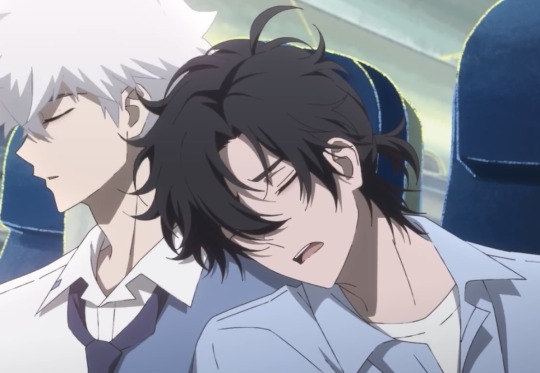
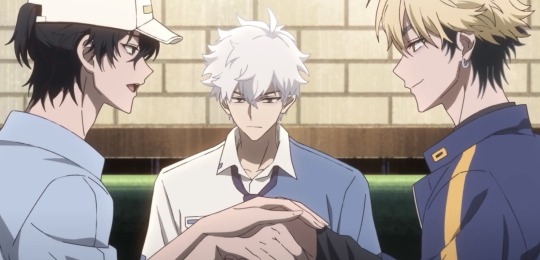

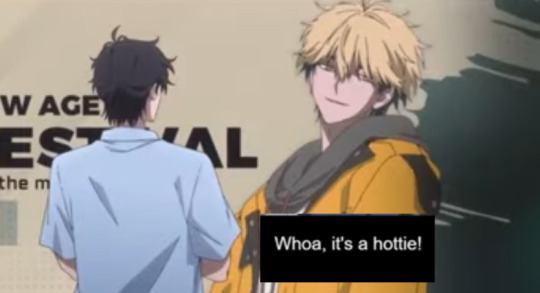
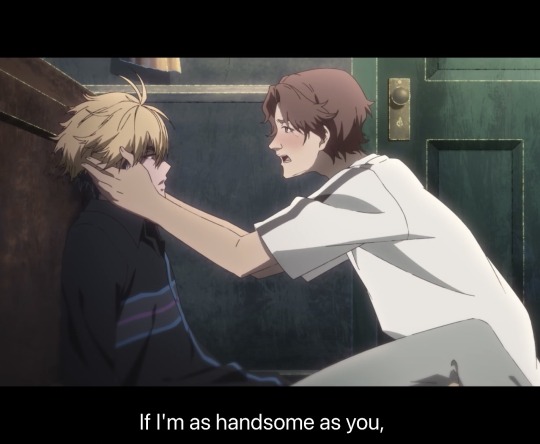
SERIOUSLY WHAT WAS UP WITH THEM TODAY……….what is bridon putting in the air
Oh yeah also there was only one bed *snirking*
Lu Guang after seeing vein in the alley

I just know this man is 9.13 seconds away from crashing the fuck out
Things we know: The book might not be that deep. If vein is some sort of being of time or some shit, he’s gonna immediately recognize Lu Guang which is not particularly good. I feel like it’s just gonna be a cliffhanger that turns into “you look…… familiar…………..oh well!!!”
Lu Guang who has nightmares about him almost every night: yeah hahahahaha…haha…ha….
Didn’t think that poor Xia Fei was going through it, I feel really bad for the guy. Why did Vein have to get to him… i punch the wall and it cracks in half
AUEGH WHAT A MANIPULATING CONNIVING DICTATOR WHAT THE FUCK IS WRONG WITH HIM. WHY WOULD HE MANIPULATE YOU. WHY WOULD HE DO THAT. Did you give in?
NOOOO!

#go home vein#i know I said it was the homo episode but you aren’t welcome here#let my buddy lu guang have one day please#edited bc I said something that LITERALYL HAPPENED ON SCREEEEN#link click#shiguang daili ren#link click spoilers#shiguang daili ren spoilers#bridon arc#yingdu arc
21 notes
·
View notes
Text
Kyoya's second shot
Episode three: Return of the bully
"What are you doing here?"
"I'd like to request Tamaki."
The twins paused, sharing a glance before looking at the girl once more. "You're blacklisted, remember?"
"No I'm not." She crossed her arms, looked like he'd have to step in.
Kyoya was at the twins side almost instantly, book in hand. "She was blacklisted last year yes, but this year she's done no wrong. You remember Tamaki's philosophy don't you?" He glances down at the twins, watching them frown and shrug, wandering around.
"The boss is weird, we don't trust her." They left to return to their post, disagreeing but conceding.
Kyoya looks down at Seika, his gaze crueller then she could ever manage. "Just tell him your banishment has expired, he'd be happy to welcome you back."
"Using Tamaki's philosophies against him?" She raised an eyebrow. "Aren't you a manipulative little homo~."
"Our agreement shall not be spoken of here, keep to yourself, princess." Kyoya gives a fake bow, gesturing towards Tamaki's table. "Have fun."
She approached Tamaki's table, Kyoya sighed and went to sit down, staring at the numbers on the screen. He glanced around for a moment before taking out his phone.
Shadow king: Eclair, have you spoken to that woman yet?
Woman: No, I've been busy. I don't see why I should talk to her when you're not even dating Rene yet.
Child: Who?
Woman: You'd know him as Tamaki.
Child: ah
Shadow king: It won't take that long, and convincing that dreadful woman will.
Woman: Ugh, at least get some progress done before you start hounding me you bitch.
Bitchboy: Speaking of which, my article is ready to print.
Shadow king: Send me a PDF.
An email arrived in Kyoya's inbox, with a link to a pdf file. He opened it, scanning down the page with a critical eye, opening a seperate application in order to edit it. No basic spell check, at least this fool knew how to spell and use grammar. But Kyoya did need to edit out most parts that painted gays in a bad light, making the story focus more on Haruhi and Renge and less on the fact that they're both women. He even attached an image of the duo holding hands, knowing full well that holding hands can often be platonic, but the girls at this school are basic, and will do anything to believe a scandal. He sent an email back, with the new link, and sent a message to the chat.
Shadow king: Post it.
At lunch, Haruhi complained that her new phone had none of her photos, she was sad to have lost all those memories. Kyoya had to sympathise with her there, he'd sort of assumed she used the cloud. Then her complaints changed when she realised her lunch box was missing from her bag- it had been stolen. As expected, Tamaki instantly rushed to her side, promising to buy her lunch for today, and she agreed, apologising as they left the club room. Huh. Tamaki didn't ask Kyoya to join today…
But it was ok, he was alone now. He made his way to Tamaki's bag, it contained two cards, Tamaki's own money, and the club's budget. Kyoya had the details memorised of course, that wasn't why he needed it. He quickly snuck over, and slipped the card into Haruhi's wallet, next to her own. He smiled cruelly, ready to play his part. He'd spent all night thinking about what he would actually do in that situation, so he's more than prepared for his starring role. Of course he'd prefer to not have the starring role, but he is the one who's in charge of finances, he has to react like he actually would.
He sits back down at the table, he needs a reason to ask for the card… he looks on his laptop, finding a little cafe in town that sold custom food platters, entirely customizable… oh, Tamaki did suggest a commoner food theme, maybe a customized platter for each host would be a good idea, and he and Tamaki could even go in person. Oh it was all coming together now! Kyoya had wanted to try some new makeup things, he'd mostly been doing the same face every day, it wasn't exactly catching any eyes by the second week. He should do something special for their day out.
Kyoya was practically bouncing in his chair, clicking his pen as fast as possible when he heard the door quick, scrambling to look busy, and normal. The other hosts entered the room, getting to their seats and doing the usual finishing touches to their appearances before the door opened. Kyoya watches Tamaki comb his hair carefully, his hair almost sparkling in the light. He called over to the king, "Tamaki! Get over here, I want to show you something."
Tamaki hurried over, leaning over Kyoya's shoulder. "What is it mon ami?" He looked at the screen, then glancing to Kyoya. Kyoya smiles softly, switching his window to the website of the little commoner store he'd found.
"Remember when you mentioned that commoner food theme? We could get customised platters for each host?" He suggested the idea, looking at Tamaki closely for his reaction. Tamaki's face lit up, clearly finding the idea a good one.
"Ooh that's perfect! Weldone Kyoya!" He pats Kyoya on the head gently, condescending but oh did it make Kyoya feel actually proud. Funny how that works. "We can all go! A club day out!" Ah. Kyoya's moment of joy evaporated at the king's words, he definitely didn't want that… but Tamaki seemed to notice how Kyoya defeated, looking at him in slight worry. "Is something wrong?"
"Well…" he started, sighing when he realised how stupid it sounded, "I'm sorry Tamaki, I was under the impression we would go alone, it does seem like a more behind the scenes type action as opposed to something we want everyone there for." He wasn't sure exactly what he was saying, he just definitely didn't want to spend time with all the hosts outside of school, that would almost definitely overwhelm him.
Luckily, Tamaki seemed to understand, he smiled, nodding. "Oh of course! It's been so long since I've spent some good quality time with my bestest friend in the entire world." He chuckles and hugs Kyoya, pressing his cheek against Kyoya's face. Said shadow king's face was heating up, feeling a pit drop at the word friend, but feeling still proud to be Tamaki's favourite person, he can ignore Haruhi's existence for a second for bliss.
"If we're going in person," Kyoya began, knowing exactly what his lines were, "you should probably get the club credit card out of wherever you've hidden it." He looked up at Tamaki, watching the recognition spark on the king's face.
"Oh! It's just in my bag, I never take it out." He hurried over, searching through his bag, Kyoya's phone had vibrated so he checked it.
Bitchboy: We're having trouble with the printer, it should be fixed by tomorrow?
Shadow king: Alright, post it tomorrow then.
He looked back over at Tamaki, smiling when he saw the colour drain from the monarch's face. "It's gone!" This caused all the other hosts to look over at him, he looked around at all of them in turn. "The club's card! The one with access to all the club funds! It's gone missing!"
Time for Kyoya's starring roll, his eyes widened, and he spun around in his seat as fast as he could. "What do you mean it's missing? How idiotic to you have to be to loose the club's money!?" His words, or at least the way he'd said them, seemed to spark panic in the other hosts, if Kyoya was worried then surely they should be too.
"Where did you last have it??"
"Doesn't Kyo-chan handle the money?"
"Did you check again?"
Words from the hosts echoed around the room, everyone was sent into a bit of a tizzy. Only shutting up when Mori speaks, quietly, but speaking nonetheless. "Calm down, check your bags and pockets, it may have been dropped and picked up by someone else." Oh, he was a voice of reason, when he managed to find that voice. Kyoya might be head over heels for Tamaki but he can't help but admit that that voice makes him a little weak at the knees.
The hosts do as he tells them to, searching through bags and pockets, Kyoya does so only to keep suspicion away from himself. He was listening for it, he knew it was coming, "oh…" and there it was. He glanced over, to see Haruhi holding the little card, and looking extremely confused. Kyoya got to his feet and was by her side in an instant, plucking the card from her fingers, face contorting into a look of disgust, one he'd cleverly practiced all night.
"So you're a thief now too?" His voice was cruel, and if any of the hosts weren't looking before, they were now. Haruhi looked up at her, eyes widening by the second. "I know you live in squalor but please, don't take us for fools."
"Wh- what?? Senpai, you know I wouldn't do that! I'm not a thief!" Clear panic on her face as she glanced around, realising that Kyoya's word ranked above her own. Kyoya knew this too, but he also knew the other hosts adored Haruhi completely, so time to take a better tone.
His voice sunk into sounding hurt, he was in charge of the money of course, but he was still a friend. "Haruhi please, you don't have to lie to us. You know if you needed money, you could have asked Tamaki, he'd be more than willing- as would most of the others." He glanced to the side, the others were nodding, Tamaki looked hurt as he rushed to her side.
"Are you ok Haruhi?? Is anyone threatening you into paying them money? If you're having troubles we can help you! We would always help you!!" He clasped her hands in his own, eye full of sadness and pity.
"Senpai… I really don't know how the card got into my bag I promise, I wouldn't steal from you guys…" She looked slightly annoyed, but it was clear there was panic behind her eyes. Kyoya was about to say something more, put another nail in her coffin- when the twins spoke up.
"Maybe it was princess Ayanokoji, she loves to bully Haruhi." They spoke in unison, frowning, hands tilted just a little. They weren't wrong, they just didn't quite get it, they were close though, and that scared Kyoya.
"Oh yes," Tamaki stood up, his pondering clear, "she recently told me her blacklisting had expired…" He looked at Kyoya, with eyes that unwittingly make the shadow king's hands shake, "was that something we wrote into the rulebook?"
Kyoya swallowed dryly, nodding once. "Yes," he gestured vaguely, "you said something about redemption and growth whilst we were discussing the club back in the planning stage, so I wrote it into the rules. I'm surprised you don't remember." Yes, that was a good idea, put the spotlight on Tamaki, what kind of a king doesn't remember his own rules.
The twins spoke again, "there's a rulebook?" They frowned at Kyoya, ugh, idiots.
"I gave everyone a copy when you first joined, the big binded file? With the colour coded ribbon?" It was true that he had given everyone a rulebook, and he was quite insulted they couldn't remember, he'd spent a whole week on those.
"Oooh," Hikaru began, a look of recognition on both faces as Kaoru finished, "yeah we threw that out." Kyoya was incredibly angry at that, but simply turned to go and sit down, clicking his pen in a more negative manner, he couldn't lose his temper, he couldn't lose his cool. Not right now.
14:25 - the card was found in Haruhi's wallet, the twins saved her. They don't care one bit for any effort I had put into the rule book, it seems my efforts are an expectation for them.
"That wasn't a very nice thing for you to do, Kyoya had worked hard on those rulebooks. I watched him bind those folders himself, there was glue everywhere!" He could hear Tamaki scold the twins for him, feeling a little better for all Tamaki cared.
"I never got a rulebook when I joined senpai?" Haruhi spoke, clearly sounding slightly shaken.
"Oh!" Tamaki exclaimed, clicking his fingers, he didn't even need to say anything else, Kyoya knew what to do.
"...I'll send you a pdf." He said flatly, going through his google drive, he was going to have to make an edit or two…
Halfway through the session, a sound was heard. Kyoya glanced over to see Tamaki coughing and spluttering, from what little he heard, it seemed Haruhi had put salt in his coffee, or rather Seika had switched the sugar for salt, he knew this was true by her smirk as she watched Tamaki scold Haruhi for being so out of it today. To Kyoya's surprise, Haruhi actually sounded stressed out when she responded. When the session ended she didn't stay behind to help clear up, she just grabbed her bag and hurried off to class.
Tamaki sighed, "I'm worried about her… she's so out of it, I wonder if she's feeling alright."
"She got caught stealing," Kyoya began, not meeting the king's eyes, "only got saved by the twins, got scolded for screwing up something as simple as coffee and didn't even bother to help clear up? Sounds to me like she's trying to spite you for something."
Tamaki paused, looking at Kyoya in clear interest, Kyoya refused to let Tamaki peer behind the curtain like he had so often done. "Are you mad at her? Do you really think that?" Oh great, he'd done it. Once again, Kyoya was angry at this man being able to see straight through him.
"Well, she did try and steal our hard earned funds, you can forgive me for being on edge." It wasn't a question, he wasn't asking to be forgiven, and Tamaki knew that. But Tamaki didn't care, he just sighed. Kyoya didn't stop, "it seems to be like there's something else on her mind, something opposing you." He didn't want to mention Renge, cause he feared that might lead Tamaki to realise he had something to do with the upcoming news.
Tamaki frowned, looking genuinely worried, "she has been distant lately…" Oh, and there was the sound of Kyoya's heart breaking, as much as this was his goal, he hated seeing his love in pain. He sighed, putting his laptop down, throwing his own pain away.
"Hey, I'm sure it's fine Tamaki, even if she is hurting you, you are so far above her, it's only natural she'd seek to lash out." He smiles softly, taking Tamaki's hand in his own. "You've got nothing to fear."
"So… you're saying she's lashing out because she feels inferior?" Tamaki tilted his head slightly, looking confused, Kyoya sighed, sure, that was close enough, he nodded. Tamaki frowned, "oh… she shouldn't, I should think of something to cheer her up. Perhaps I'll take her on a date this weekend!"
"Not before our day out?" Kyoya frowned, hating the outcome of this situation, becoming confused when Tamaki chuckled.
"Oh of course not Kyoya, don't worry." The king smiled, reaching up and ruffling Kyoya's hair. "I missed spending time with you, even if you can be a little demanding at times."
Kyoya had to chuckle at that, feeling reassured that Tamaki was still going to prioritize him. "You're one to talk, remember when we first met?" He didn't even need to elaborate to have Tamaki laughing, knowing full of what Kyoya had referred to.
There wasn't a hosting session at the end of the day, there'd been too many accidents that Tamaki had decided to hold an impromptu meeting. Haruhi was late, so where the twins but that was irrelevant. Kyoya frowned as she walked in, crossing her arms. "A thief and a truant? Are you planning on playing the delinquent this year?"
"Shut the hell up Kyoya!" Hikaru snapped at him, causing Kyoya to all but squeak in alarm, he hadn't been expecting resistance. "She's being bullied if you hadn't noticed, and your stupid comments aren't fucking helping!" Kyoya glanced around the table, it seemed he'd gone a little far, but no one cared about what he'd said, in fact he was being completely ignored in favour of their precious Haruhi being bullied.
"You're being bullied??" Tamaki stood, looking so very worried. "What happened?"
Haruhi didn't say anything in response, choosing only to sigh. It was Kaoru who spoke up, "someone spray painted on the window outside the classroom, essentially calling her a gay whore."
"Oh ouch." Wait shit, did he say that outloud? The other hosts were looking at him, at least they'd stopped ignoring him?
"Yeah…" Kaoru began, letting Hikaru finish, "we stayed with her to talk to the teacher."
Haruhi went to sit down, burying her face in her hands. "I just want to go home and take a nap…" God, Kyoya hadn't expected to feel for her, but Ayanokoji had gone way too far, this was disgusting.
Shadow king: WHAT THE FUCK IS WRONG WITH YOU??
A GAY WH*RE? DID YOU REALLY FUCKING CALL HER A GAY WH*RE?
Child: cranky cause you're also a gay whore aren't you?
Shadow king: You're like 13 shut the fuck up.
Woman#2: You told me to make her life hell, that's what I did.
"It's ok Haruhi, you can leave if you want…" Tamaki started, frowning, eyes full of sadness. But he paused, looking down at Kyoya, "who are you texting?" Uh oh.
Kyoya spoke plainly, not letting the other's see his eyes behind his glasses. "I'm putting Seika Ayanokoji back onto the blacklist, at least until she proves it wasn't her." He pauses, noticing how Tamaki appears to approve. "I will also have a talk with her about why she was removed from the blacklist, and how she can get back off of it."
"Hm, good idea Kyoya." Tamaki nods in approval before turning back to Haruhi and going to hold her, she lets him for once, but doesn't reciprocate.
Shadow king: I've put you back on the blacklist for the time being, the hosts are on to you.
Woman#2: But our agreement???
Shadow king: Is only valid if you're actually useful.
So try being useful.
Everything but the graffiti was alright.
And don't forget the school has cameras.
Woman#2: Don't be such a baby.
Shadow king: Don't be so insolent.
He sighed, leaning back in his chair. Tamaki glanced at him, clearly on edge, and Kyoya decides this silence is too unbearable to stand. "Well, I think this meeting has been enlightening. But I'm sure we're all tired, so, Tamaki?" He didn't have the power to dismiss the hosts, but he had the power to ask Tamaki to do so.
And who was Tamaki to refuse him? The king nodded, sighing and curling a lock of Haruhi's hair in his fingers. "Of course, you're all dismissed, you may leave if you wish."
Most of the hosts got up and left, mumbling condolences to Haruhi as they did so. Kyoya began slowly packing his stuff away, he could feel Haruhi's eyes were on him. He didn't feel shame, only pity. He stood up, slinging his bag over his shoulder. He glanced down at Haruhi, "I hope you have a better day tomorrow," he spoke curtly, almost mocking her in a roundabout way, but genuinely meaning that, the news story won't affect her nearly as much as the graffiti, and at least she'd get a reprieve.
Shadow king: Before I forget, don't go after her tomorrow, the article will be enough.
Woman#2: So much for making her life hell, you coward.
#tamakyo#ouran high school host club#ohshc#kyotama#kyoya ootori#hikaru and kaoru#kaoru hitachiin#hikaru hitachiin#haruhi fujioka#takashi morinozuka#mitsukuni haninozuka#tamaki souh#kyoyassecondshot
9 notes
·
View notes
Note
Hey! So I'm new to shipping Destiel even tough I've been a fan of the show for years now ( I was never and anti or anything just didn't ship it if that makes sense). I'm fully on the DeanCas train now and I'm really excited for the current season. I feel like the writers are definitely building up to something because why else would they put so much focus onthem in the FINAL season. But at the same time I'm worried that its all gonna be resolved in a big no homo moment. What do you think?
Helloooo!!!! Welcome! And that makes complete sense don’t worry. There are some people who still don’t ship it but aren’t antis or anything. To each their own!
Welcome aboard though! Woowoo!
Your fear isn’t unfounded, and statistically, there is always always that chance – so I always tell people to allow their heads to be up in the clouds because the view is nice and the sky is beautiful. But! Always keep your feet on the ground.
I’m heavily Destiel positive and optimistic, but it’s only because personally it checked my own requirements for canon already, and if it doesn’t go undeniably canon, I’ll still be okay. Not everyone is like that, and I understand that.
BUT – let’s take a look at what’s leading a lot of us to light our cannon (lol). Since this is a new frontier for you, I should specify that the ship has faced ups and downs in terms of ‘will they or won’t they’ with The Powers At Be. So get this:
Bobo Berens, writer and EP, wrote 15x03, and all that emotional NONSENSE (treasure). He revealed on Twitter that they had edited that ‘break up’ scene heavily. More than once! They wanted to get the right tone, feeling, atmosphere in that scene and they did. They worked hard at it, reading to me, that it was important. Also, 15x03, that’s the final blow. First episode was a cut off of a sentence, second episode was ignoring, and now third episode is goodbye. It was a string along all three episodes that began last season.
Bobo is also going to be the writer in 15x09, aka, when we’re going to get a ‘prayer’. The spoiler first dropped at DC Con from Jensen of all people which was cool. Here’s a post on it. And here’s another post on it where it’s described as a ‘confession’. Don’t know to what level that means, but it’s something. Also, keep in mind this was brought up in an article (I don’t have that on hand) and their relationship was brought up AGAIN yesterday at Jaxcon.
My personal belief is that Bobo was specifically charged with 15x09 to say what Dean wouldn’t say that night in the Bunker. Or, at least some of it.
Also, all the hype around this 15x09 scene, they know if they get caught with their dick in their hand (aka, not giving us what they know they’re teasing us with) that they’ll lose credibility and even a good chunk of Fandom.
Why do I think they know that? Because the writers, and now ACTORS are in on it all. They’ve known about this ship for the longest time. It’s hard to keep it quiet for 11 years. Jensen, especially with his own small reservations (and then being manipulated by bros only fans was annoying as well), and now, talks about it openly without hesitation. See that here!
They all know what the majority of us are waiting for, and they know if we don’t get something that their reputation will fall by the end of the season.
There are a few more reasons but this is getting long so I’ll also say this:
I like parallels. I don’t like gluing parallels together but I like parallels and right now, the parallel I’m focusing on is Sam getting a win of sorts in him getting to touch something “real”, getting to create something “real” and getting confirmation that things can be “real”. Not saying everything is perfect, but I’m saying it’s a step in the right direction.
The last three episodes (456) felt a little more skewed in Sam’s direction, much to the same beat as 1,2,3. I said earlier that 1, 2, 3 had a string with Destiel through it. Now, we had a string of Sam’s grief, ending with his big scene (much like the break up was 15x03′s big scene). I now think that 7, 8, 9 is going to be Dean’s journey to “what’s real” and Cas has moved into that position because he put himself there in episode 2 “We are (real)”. What can be the big scene in 9 (much like 3 and 6?)
The prayer scene.
SOOOOO
I don’t want to fall on the fire for getting someone’s hopes up, but I just want to explain why my head is in the clouds right now (with feet on the ground).
Not everything will be how we imagine, and the writers can’t read our minds and don’t read our fanfiction (for the most part). But, I’m seeing more concrete evidence now than I ever have, and that’s saying something because we’ve had Some Moments in the past.
I hope I helped Nonny!
(PS, while I don’t have the articles on hand, Dabb and co said this season is more emotional-based and that’s been clear so far).
#this got WAY longer than anticipated#spn spoilers#spn#1503#1509#spn spec#destiel positivity#Anonymous
18 notes
·
View notes
Photo

WELCOME TO THE #WAYWARDSISTERSNETWORK
With the Wayward Sisters episode coming up soon (January 18 2018) I figured it was odd that I haven’t seen a specific tag for our lovely ladies, and I thought I might as well be the one to establish it.
This isn’t anything fancy, but simply just a way to track, and to tag all content related to the Wayward Sisters. We are talking gifs, graphics, fanfics and the likes related to characters and actresses, both from the actual show and their appearances on Supernatural.
There aren’t any exact rules, but there are some guidelines I wanna suggest, to make the tag a lot smoother for everyone to browse through:
The Boys: we are a lot who loves the boys, and Supernatural, but one of the reasons I thought of this tag, was to avoid having to go through endless pages of stuff not relevant to the Wayward Sisters to find actual stuff involving them. So, to make it all neater and easier to go through, please keep the boys only in the tag when related to the Sisters.
Respect privacy: I know it can be so exciting to hear news about your favorite actresses, but please respect their privacy. Stick to sharing what they share themselves. They’re regular people with a cool job, and they deserve their time off - and for the personal life to be kept private.
No underage NSFW content: not only is this creepy as hell, it is also against the law to produce content involving minors in sexual situations. This is legally categorized as child pornography. Fictional or not, child pornography is not cool and I will not hesitate reporting it to Tumblr.
No Whitewashing: we have been blessed with two amazing actresses of color, and there is no excuse for whitewashing. If you aren’t familiar with this term, this means that in gifs and graphics their skin colors should not be lightened. In writing this means to research their culture and keep that in mind when writing.
No drama/wank: it’s never cool to be excited to come to a tag only to see the first couple of pages blocked out with negativity. Some big pointers I can think of here are: Supernatural hate, character/actor hate, racism, homo/bi-phobia, attacking other tumblr users, ship wars, etc. Really, just be decent people, and don’t spread bad vibes.
No misogyny: it is sad that this has to be said, but Tumblr has some dark people. This is a show for women, featuring women, and it is meant to empower women. So if you have some kind of misogynist view, you are really not welcome.
If you have any questions about anything, please feel free to pop into my ask box. Please reblog this post to share with others who could find interest in it, and then there only is left to ask you to use the tag. I am already tracking it, and I am super excited to see what everyone can come up with for our ladies! xxx
#thespngraphicmakersnet#godshipsit#prettyboydean#idk anyone else who might be interested?#i have no friends lmao#waywardsistersnetwork#wayward sisters#supernatural#spn#mine:wayward sisters
69 notes
·
View notes
Text
summer anime 2017 part 3: welcome to die
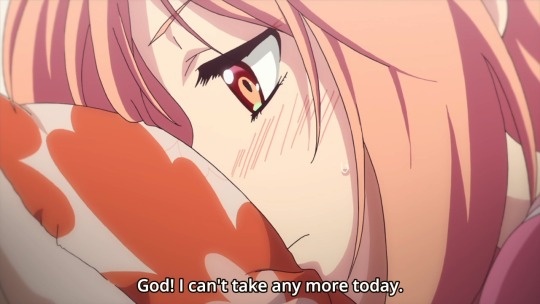
Well guess what, I ended up putting posts off for a week.
Again.
So don’t expect a lot of detail here, but do expect a lot of shows.
See also:
• part 1: we can rebuild it
• part 2: bunch of fools
18if
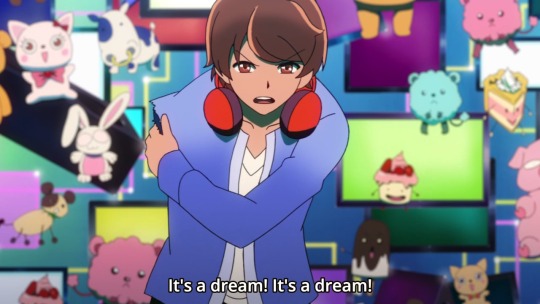
18if is a really weird show about a guy who hangs around people’s dreams and fixes their personal problems - sort of like Persona 4 meets Madoka’s witch mazes. This might have some visual potential if nothing else, and it tries, but what mostly sticks in the mind is that it’s very cheap and also extremely clunkily directed, with a lot of spinning camera tricks that end up looking more desperate than cool. While that does lend it a certain nightmarish weirdness, I doubt it’s entirely intentional and more importantly it makes the show not very entertaining.
Action Heroine Cheer Fruits

So someone made a Love Live clone only with solo tokusatsu performance (?) instead of idols and saving the town instead of saving the school. And the main character is Kotori. Well, silly things happen all the time, but what I didn’t expect is that an anime called Action Heroine Cheer Fruits is actually pretty damn good. Shows of this type aren’t very complicated, but Cheer Fruits nails it where it counts: The characters are likeable, their misadventures are amusing, and the writing is good enough to make me care more about what happens to this town than Sakura Quest managed in half its two-season run. It’s a bit on the cheaper side, but I don’t mind if the fundamentals are this convincing. It also helps that this is written by Naruhisa Arakawa, who previously failed to convince me with active raid but definitely knows a thing or two about tokusatu. Charming and with an appropriately light touch on its silly conceit, this is the surprise of the season.
Ballroom e Youkoso

It’s a sports shounen! About ballroom dancing...? Well, the manga is fairly well known so the shock factor wasn’t that high here, but I have to say that Ballroom e Youkoso nails the formula, the unusual sport in question makes it less boring than said formula would normally end up being, and it looks pretty amazing. I’m willing to take that chance, if everything goes right this might end up delivering on what Yuri on Ice promised for its first three episodes. Minus the gay of course, but I’m willing to give that up for a show that’s actually consistently entertaining instead. Fingers crossed.
Centaur no Nayami
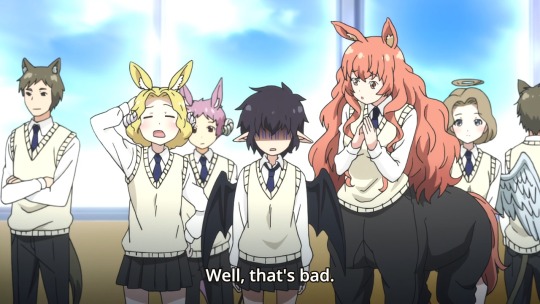
Yay, it’s another monstergirl manga. This particular one ends up splitting the difference between Monster Musume and Demi-chan, meaning that it only has weird fetish undertones some of the time. Apart from that it ends up mostly boring, because the monster stuff doesn’t really matter, yet the show spends an inordinate amount of time explaining the specific evolutionary circumstances that made this universe possible. Uh, at this point I think I can just accept monstergirls at face value, thanks. The most interesting parts are some hints of this society being not as innocent as it seems, but the other 99% of time it doesn’t seem overly concerned with that: The actual content is just rather boring slice-of-life scenarios of the kind you can get elsewhere easily. I do have to say that opening with girls actually kissing for real is a new one, even if that doesn’t really go anywhere. And that’s really the long and short of it: This seems like a show that doesn’t even really aim to go anywhere, and just isn’t good or interesting enough to make the here and now worthwhile.
Clione no Akari
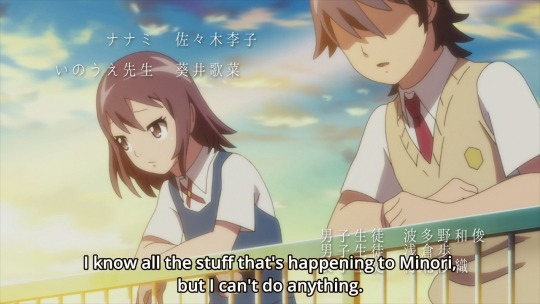
This is a 1/3 length short that mostly seems like an anti-bullying PSA. The most tragic girl in the world (sick, orphan, shy, prone to tripping over obvious buckets in the middle of hallways, etc.) gets bullied on top of everything and some other guys feel bad about not helping her. The opening makes it look like everyone will learn a lesson about tomodachiship eventually. I will be nice and say that its heart is in the right place and it’s not actually bad (only extremely hamfisted), but it’s just neither well made nor unusual enough to earn back the time spent watching it; Koe no Katachi has me covered for life on anything this could possibly do.
Dive!!
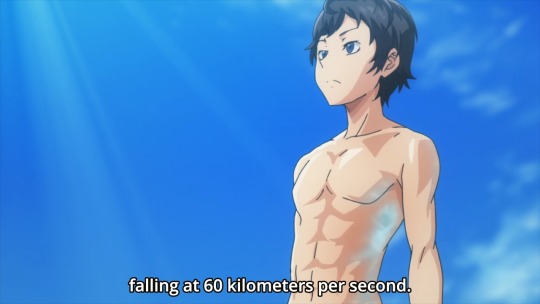
Do you like ripped dudes glistening in the sun? Sure you do, that’s why you all watched Free! and that’s why we now get another show about pool sports with too many exclamation marks in the name. High diving seems to be a pretty poor choice though, because a single dive takes seconds and this show doesn’t pretend otherwise. The filler around it isn’t very promising either; main dude mostly memorable for being a dick to his girlfriend and admiring his cool senpai instead, no homo. Oh yeah, Yuri on Ice is a thing too, you know. Otherwise you learn more than you’d care to know about the spectacularly uninteresting financial structure of the high diving club, and get to watch the water surface reflecting the sun on to toned abs. Too bad that this particular effect just ends up looking like an unfortunate skin condition. All in all Dive!! is just a poor man’s version of other homoerotic sports anime for fujoshi, and I wasn’t too fond of those to begin with.
Hitorijime My Hero
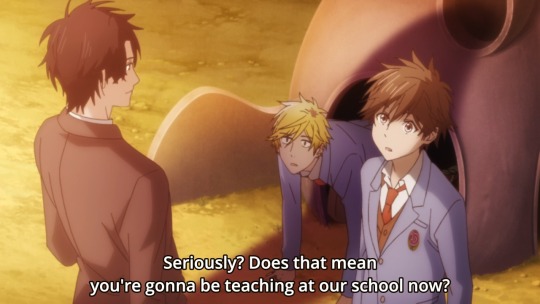
Speaking of manlove, this one starts out as a fairly engaging character study of a highschooler who hangs out with street thugs because his mother is a prostitute, until the brother of his BFF beats them all up. But then the OP happens and after that it’s pretty much just straight up yaoi tropes because now the dude’s in high school and the cool guy is a teacher, I wonder where this is going. There’s a lot of unfunny komedy and so on. Yeah nah, even a toned down Super Lovers is not what I’m looking for, and laudable opening aside this brings nothing new to the table.
Isekai wa Smartphone to Tomo ni.
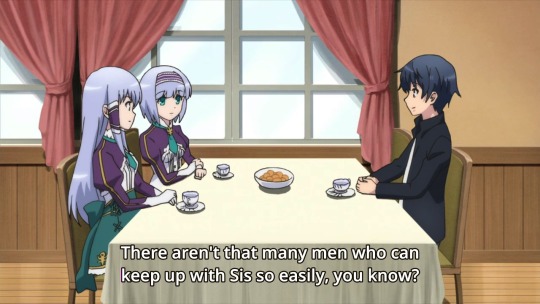
I’ve been very mad at smugly ironic genre shows that wallow in the cheapest clichees while “deconstructing” them (i.e., just pointing them out as if that’s an excuse). But the alternative is, of course, just not doing that and playing it all straight without a hint of irony, and it turns out that that is significantly worse. So here’s your 24 minutes of isekai light novel: dude dies, goes to JRPG world and gets to keep his smartphone in complete working condition. Ha ha, I too wish my completely ordinary household item would make me the coolest dude in the universe. But this show goes the extra mile, because while a smartphone might get you some chicks in fantasy land, to get all the chicks you also have to have:
• literal god mode stat boosts
• ability to use all magical elements, an exceedingly rare feat
• access to an even rarer additional magic element on top of that
• the ability to create the irresistible potion “ice cream”
So yeah, this is the isekai power fantasy at its most naked, and apart from making our shitter in chief the most hax guy ever and dropping a huge instaharem on him, he goes beat up trash mobs because that’s what you do. Again, all of this without the slightest hint of self-awareness. Absolute garbage for garbage people from top to bottom, and completely fails to make said garbage fun.
Jikan no Shihaisha
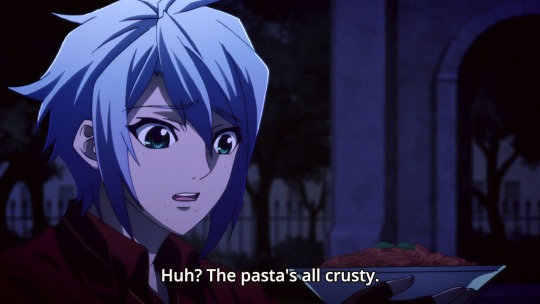
This one at least has the looks down: When it’s an action show, the visuals are really, really cool. Honestly. However, upon further inspection it becomes apparent that this “Chronos Ruler” here is so poorly written that it cannot be ignored. You guessed it, a lot of exposition and poorly conceived comedy ruin the eyecandy pretty quickly, and it’s all so dumb and dull that I barely remember anything but a vague stink of disappointment. It’s two guys that fight monsters, only not very well? Something about trying to turn back time but that turning out to be a bad idea? It’s all just slush. There's a twist in here that's kind of funny (probably unintentionally) so I won’t spoil it, but it’s by no means worth it.
Konbini Kareshi
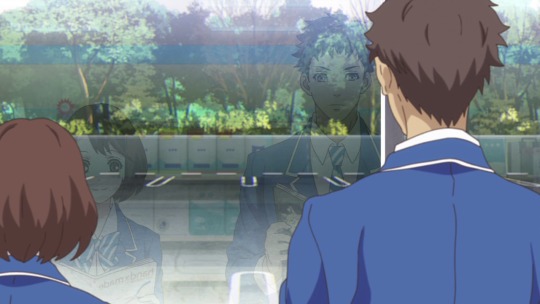
Konbini Kareshi is an anime about some highschoolers that have relationship problems and hang out in a konbini, and that’s pretty much it. It’s extraordinarily slow, but somehow I did not end up finding it completely dull - possibly because “nothing happens” also means that nobody talks in this case. A lot of the episode is just awkward, silent situations, with information imparted visually (body language, expressions, etc) instead. Imagine that. Now I don’t want to praise it too much because nothing pays off and, well, nothing happens - but it is actually something markedly different from what you usually see in anime and that’s got to be worth something. I am not sure if I want to give this more chances, but that’s better than being quite sure I never want to see it again, right?
Made in Abyss
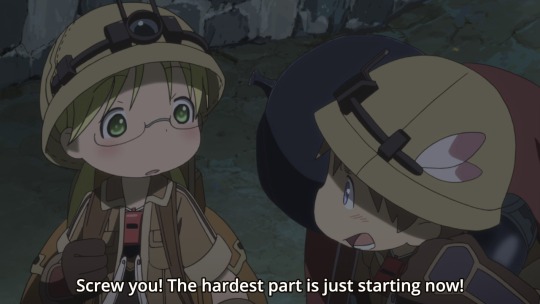
If you want to have a master class in how to start a fantasy adventure anime, check out Made in Abyss 01. It just drops you into an utterly beautiful world, sets up a couple of endearing characters and their general situation without boring you with the details, and the explains just enough about the world to answer a few pressing questions that can’t be ignored at the end. It’s beautiful too, great design, great animation, lush backgrounds, the whole shebang. Now it’s essentially a story about a bunch of very young orphans that go spelunking, and the character designs remind me of Ichigo Mashimaro of all things, but I detect no sketchiness here. Obviously it now has a tough act to follow over a whole season, but for the type of show it is you couldn’t ask for a better layup.
Nana Maru San Batsu
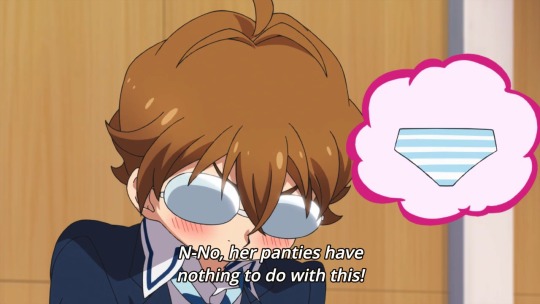
Also known as “Fastest Finger First”, this show asks the question: How do you make watching a trivia quiz interesting? Well, the answer is that you don’t. It seems to be a very basic school club show and the topic of the school club is buzzer quizzes. And somehow this fictional story manages to be less engaging than your average actual TV quiz show. Buzzer quizzes don’t have a lot of strategy involved (the show tries to pretend otherwise, but mostly fails), just watching people in quiz-o-vision trying to answer fairly mundane questions is hardly riveting, and besides that it’s just a decidedly subpar comedy. This could have worked if it went full ham like Kakegurui, but it neither has the means nor even much of an inclination to try that.
Netsuzou TRap - NTR
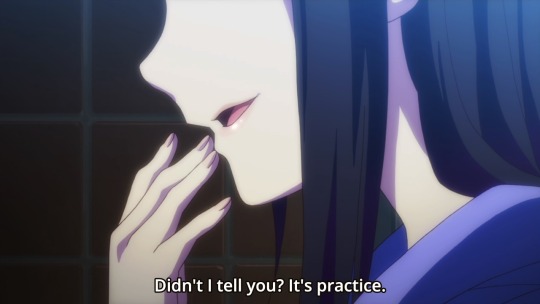
So here’s the long-dreaded adaptation of the yuri manga that’s so full of bullshit drama that even actual fans of bullshit yuri drama hate it to the point where it became a running joke. And yeah, this sure is bullshit yuri drama about two girls who casually make out while boyfriends aren’t looking too closely. One feels bad about it, the other is a troll. All in all it’s reminiscent of Kuzu no Honkai, except that KnH at least was fully aware that its entire cast was awful people; I can’t even make out what I’m supposed to think about these shenanigans. Now I could say that episode 1 shows potential if it develops properly, but the manga is such a known quantity of bad writing that that’s not a smart idea. It will probably just be Girl A feeling conflicted and Girl B trolling her forever.
Princess Principal
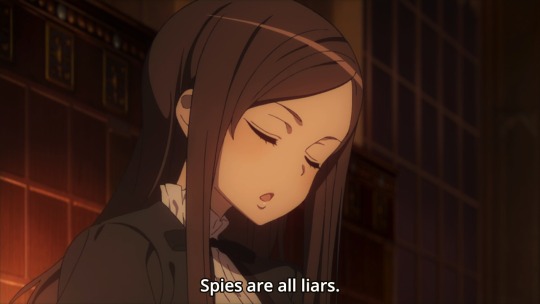
Steampunk is pretty much a laughingstock these days, but I will say that Princess Principal nails the aesthetic if nothing else. It is made of steam and punk; you get your top hats, you get your gears, you get your airships. It’s all pretty cool looking and it also has some nice action. What it’s actually about is some sort of Cold War in divided London, and our protagonists are a crew of schoolgirls that talk about being spies a lot. This is where it becomes apparent that the writer of this was previously convicted of having committed Code Geass (yeah, that guy again), so a certain degree of schlock is to be expected. And really, who else could come up with Steampunk Cold War Berlondon featuring murderous gothlolis? So overall, it’s quite a bit more trashy than I would like but it could be able to pull it off reasonably well on production value alone, and hopefully the writing won’t shit the bed too hard.
Saiyuki Reload Blast
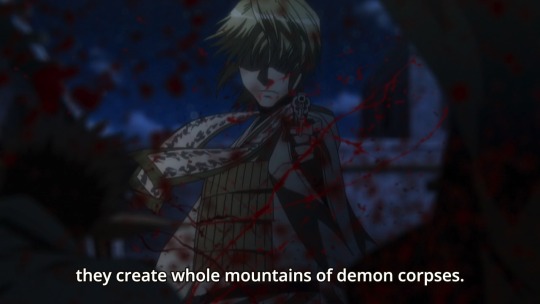
Saiyuki is an old shounen property that adapts Journey to the West. Not to be confused with Dragonball, because this is spaghetti western instead of wuxia. Or so it seems, I’ve never watched one of the anime adaptations that keep getting made every decade or so before. But hey, Reload Blast being a sequel to an anime last made when the ostensible target audience wasn’t even born yet at least has the benefit of not having to deal with tiresome origin stories, we just get to watch the characters do their thing and it’s reasonably easy to figure out anyway. It’s just that it’s not actually all that good; fans of a time when shounen heroes generated a lot of blood spray may get something out of it since it’s pretty violent, but otherwise this iteration of the JttW party are just a bunch of dicks that are trying hard to be cool but aren’t. It’s probably alright for fans of the source material and people hankering for throwback anime, but I don’t think it’s for me.
Shoukoku no Altair
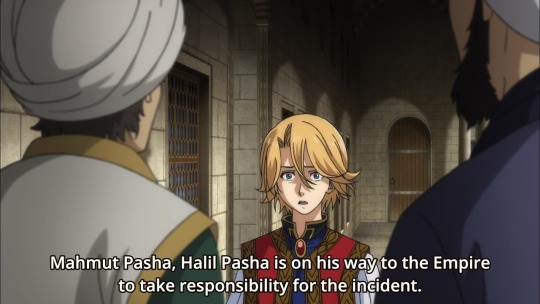
As far as fantasy settings go, a Ottoman-themed one isn’t the most common. So the hero of Shoukoku no Altair hails from fantasy Turkey, which is embroiled in some sort of diplomatic brouhaha with fantasy Germafrance. And that’s really where I start tuning out because this is one of these fantasy epics that start by introducing a million characters that surely will become important eventually, but give me little reason to care about anything otherwise. Exotic locales aside, Altair seems to be mostly setup and the rest of it, the characters, the intrigue, the politics, everything, just don’t motivate me to find out more. It’s possibly not a bad show, but it’s a barely memorable show in a genre I am not particularly fond of.
Tenshi no 3P!
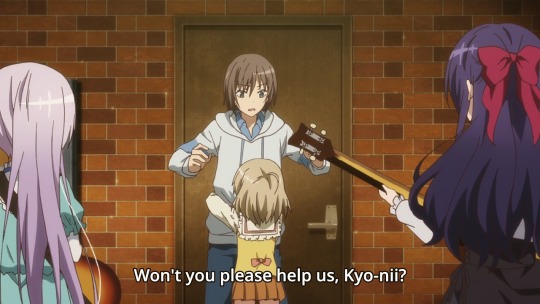
Sometimes it really helps going into random new anime without any previous knowledge. Like here: Tenshi no 3P starts out with a moderately well thought out character sketch of a hikkikomori that spends his day making music and uploading it to the internet. More than a bit tired, but not bad. He then gets a message by “a guy” that wants to work with him. Well, surely nothing bad can come of this. The “guy” turns out to be a primary schooler (girl) from an orphan primary schooler (girl) band that is actually super good but nevertheless needs the services of a music otaku schlub for vague reasons. And then in the end the primary schoolers offer sexual favors in exchange, possibly as a joke but I wouldn't count on that. See, I had been making Ro-Kyu-Bu (i.e., ”Rock-Yu-Bu”) jokes way before that, but as it turns out 3P is by the same author and oh boy can you tell. So it’s this season’s Eromanga-sensei, only somehow worse. I have to admit that I am not even above watching something like this if it’s legitimately great, but thankfully Tenshi no 3P is not even close to being legitimately great. Dodged a bullet there, for sure.
But hey, maybe we will at least get another very embarrassing T-shirt out of it.
Vatican Kiseki Chousakan
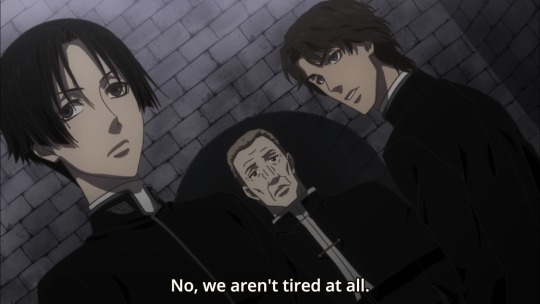
And finally, we have a show about some priests from the Vatican that travel the world to examine miracles. Well, one miracle at least, in Guatemala. The concept is somewhat intriguing and could make for a nice horror/detective hybrid with a twist, but I wouldn’t trust anime to pull this off properly, and so it’s no surprise that it doesn’t. For starters we get a pair of very pretty leads that seem primarily intended to bait yaoi doujins, and while it admirably tries for an off-kilter (literally, hope you like dutch angles) horror atmosphere, it is more concerned with out main character’s angst. Yeah I don’t know, the intrigue doesn’t seem particularly intriguing either and the horror just doesn’t quite click - it’s trying for gothick ostentatiousness, but doesn’t quite pull that off. I’d be willing to give this a chance if it was a miracle-of-the-week kind of thing, but considering the amount of characters they introduced for this first case that doesn’t seem to be how this show operates. Or at least I’ll wait until more information becomes available.
#anime#impressions#summer2017#18if#action heroine cheer fruits#ballroom e youkoso#centaur no nayami#clione no akari#dive!!#hitorijime my hero#isekai wa smartphone to tomo ni#jikan no shihaisha#konbini kareshi#made in abyss#nana maru san batsu#fastest finger first#netsuzou trap#princess principal#saiyuki reload blast#shoukoku no altair#tenshi no 3p!#vatican kiseki chousakan
1 note
·
View note
Text
Philanthropy Misunderstood by Bob Hopkins
Philanthropy Misunderstood by Bob Hopkins
The word PHILANTHROPY isn’t new, but many think being a philanthropist is about money. In Bob Hopkins’ new book, he assures us it IS NOT. He and 100 of his friends define, by way of their good deeds, that philanthropy is about LOVE OF MANKIND. Philanthropy Misunderstood is a 256-page coffee- table book that will surely entertain and inform you. You won’t want to put it down. It is colorful and exciting.
“Bob Hopkins Introduces us to 100 plus new best friends…people like you and me who give of themselves who actually LOVE others. What a joyful time Bob shares with us. Optimism and hope emerge from every page. Each person’s story sparkles. Each one makes us prouder to be fellow ‘homo-sapiens’.” Dr. Claire Gaudiani, philanthropist, author and international lecturer.
Bob recalls his first experience with his mother when he was five years old in Garden City, Kansas as they delivered groceries to a poor family during the holidays. He remembers the pat on the back he received from someone for doing good. “Maybe it was God,” he recalled.
For more information, go to Philanthropy Misunderstood.
Read the Interview
Hugh Ballou: Greetings. Welcome to this episode of The Nonprofit Exchange. Wow. This is going to open your mind to a whole new world. I just met Bob Hopkins recently on a recent trip to Dallas. Some of our previous guests that started Barefoot Winery said, “You have to meet Bob.” When I was in Dallas, I rang him up, and we met. They had shared his book with me called Philanthropy Misunderstood. I thought it was a nice book. When I started digging into the stories and what Bob knew about philanthropy, I said, “We have to share this with other people.” Bob, welcome to The Nonprofit Exchange. Tell people a little bit about you and your passion.
Bob Hopkins: Thank you, Hugh. I am so honored to be invited to be here with you as your guest today. I am glad to know that there are some other people in the book in your audience today. I am an older person. I have been around for a long time. Every 20 years, I ask myself, “What am I doing, and where am I going?” I have divided myself into four different segments of my life. I am on the last 18 years. I give myself another 18 years to live. I am trying to figure out what to do, so I am probably going to go to a seminar called PSI in June to find out what I’m going to do next.
But, Hugh, I have been involved with this word “philanthropy” for the last 45-50 years. I learn more about what it means all the time. Then I became confused and realized that what I thought philanthropy was is not. Or maybe it is part of, but that’s why I had to dig into it and tell stories of 108 people who actually do philanthropic things for other people. That’s what this book is about.
Hugh: How long have you been engaged in the nonprofit arena with leaders and different kinds of organizations?
Bob: I came to Dallas in 1984. I had just been involved as the director of development on the National Council of Alcoholism and learned all about this word called “fundraising” and philanthropy. Found out that the two of them are together as one word and one meaning, and they are also separate things. Some people get them mixed up. They think that fundraising is about money, but so is philanthropy. I have learned that philanthropy can be about money, but largely not. Instead, it’s doing good things for others. That’s how I got involved with this. I have been in Dallas for 38 years, and I have been working in raising money and now writing a book. I did a magazine called Philanthropy in Texas for a while. Every decade, I learned a little bit more about what that word means.
Hugh: Bob, you and I are in our mid-70s, we’ll say. We could be sitting back, chilling, and not doing anything. But you and I have a passion for being engaged. Why aren’t you sitting around? You’re teaching classes, and the stuff that you’re asking your students is really profound. You’re active with some local charities still. Why is this important to you?
Bob: I don’t know. I do it because I don’t know what else to do. I do play tennis, and I do ride horses. Those are two of my hobbies. I do spend time doing those two things every week, so it’s not like I’m constantly thinking about philanthropy, even though I have a horse named Philanthropy. I watch the USTA, and did you know the USTA is a nonprofit organization? They wouldn’t survive if they didn’t get contributions from people. They do good for others. I guess I’m involved with philanthropy pretty much all the time, even though it’s my joy. I love doing it. I like talking about it. I like telling people about it. I like finding people who are doing different new things. I have found so many people over my 40 years that I decided to put them in a book. That’s where Philanthropy Misunderstood came from.
Hugh: I’ve had the joy of visiting a couple. The whole family does this water project. I won’t get into it, but I want you to tell people. You called them up and said, “You have to meet Hugh.” I went over there, and it was an amazing visit with the whole family. I met the couple. I didn’t meet the kids, but I have heard about them and their involvement. How about highlighting some of the stories? Let’s talk about this one first; they will be guests on the show in June. It’s folding paper. How does that help people?
Bob: This is a crazy story, and it’s a fabulous story. It’s been so fabulous that it’s been on Good Morning America. Neiman Marcus actually helped these girls sell these ornaments that are called origami that they make. Their church and schools make them with them. They have volunteers of hundreds of people who do nothing but help make origami, and they sell the origami for $50-$75 a piece. To date, they have raised over $2 million building water wells to actually give water around the world. 170 different water wells in 17 or 18 different countries. These girls are 15, 13, and 10 years old. They started it when they were 4, 5, and 6 because Daddy is part Japanese. He said, “We need to do some origami.” One thing led to the other. I’m not sure what the other is and how detailed you have to get in to find out what the thinking was of the parents, about involving their children in making these origami. That’s their life. It is now their life. These girls are so smart because they are in a business. The 15-year-old is the president of the foundation. It’s a cool thing.
Hugh: I went to visit the whole house and the project. These volunteers come in to do the folding. It’s engaged people in a focus. I don’t know if the people come in and do that right now, but maybe the family can do more while the kids are out of school. There is another story in here that has a big picture, and it’s Bonnie and Michael with Barefoot Winery. They were guests a couple months ago, and they were the ones who connected us. Tell the story about how you got connected and their story in the book.
Bob: It’s so interesting because Eric is actually the one who introduced me to Bonnie and Michael. He was the marketing director of Barefoot Wine. What Bonnie and Michael did, when they couldn’t sell the wine, because nobody wanted to buy it because there was no place to buy it, and liquor stores didn’t want to buy it because nobody was asking for it. They started giving it away to charities on the beach in beach towns, mainly starting in Florida. He would give it to them for free, and he said, “If you like it, go to your grocery stores and tell them to buy it.” Long story short, over 15 years, it became the #1 wine in America. Bonnie and Michael did it through giving wine away to charitable causes. I know that they had a marketing plan here. They said, “This is cause-related marketing,” which are words we used to use. They didn’t really know it was philanthropy because they really wanted to sell wine. But it also made them feel good, too. I have taken Bonnie and Michael on a philanthropy trip to Mexico. So I got to watch them in action. It didn’t have to do with wine; it had to do with building schools and painting houses for people in Mexico. It’s a great story. They are in the book, and they should be.
Hugh: The book is what you would call a coffee table book. It is hardbound. It’s a $45 book. The quality of printing and the quality of the stories and an amazing layout and design. It should be $100. It’s one of these treasures. My fourth book, which you have a copy of, Transforming Power, I teach people how to do things. I got to a point where I said, “Hmm, people want to be inspired by stories.” That’s one of the premises behind this show is for people to tell their stories. There are people out there in the trenches who are struggling to make ends meet, to pull people together, to rally volunteers, to rally their boards, to rally their funders. Let’s talk a bit about this title and what’s behind it. What is the biggest misunderstanding on both sides, the funder and people seeking funding?
Bob: It started with me. I was always told that philanthropy was about money. I started a magazine in Texas all about people who had money and gave it away. I would come into my staff and say, “I think we need to do Boone Pickens on the cover of the magazine. And the first question was, “How much money does he give away?” That was the common question. That was whether or not we were going to put him in the book on how much money they gave away. Finally, after a while, I realized, You know what? I know a lot of people who do so much more than writing a check. They’re never recognized.
I have this incredible woman from Houston named Carolyn Farb who spends 26 hours a day helping people learn how to raise money, but also build a hospital, and do all kinds of things. She is not known to be a huge giver, even though she is a giver; therefore, her picture would not be on the front cover of anything because of money. But it would be because of the word “philanthropy.” I realized, because of Carolyn, that I was talking to the wrong people. I needed to be talking to people who were in the book. The people in the book probably give money as well, but that wasn’t what I wanted the focus on. I wanted them to tell me why they do what they do. Why do they build origami and build water wells around the world? They don’t get any money for it, and they don’t give any money. They give things. Well, they do give money because they raise money in their case.
Bonnie and Michael, they give money, too. Instead, they gave wine. Chip Richey gives his time and effort and expertise in filmmaking. He’s made lots of films about the Indians and Oklahoma. He did things for me for my philanthropy courses. There is Jordie Turk who was a student of mine, who volunteered on his own dime to come to Dallas and video my launch party. His name is not even on the piece. But he did it. He loved it. He is happy about it. I think that’s what philanthropy does, moreso than what money does, is gives you joy. That’s what everybody says. I get so much more out of what I did than what I gave.
Hugh: Philanthropy is both. We have to run the organization. It’s like having a car. You have to put gas in it. But there is a bigger piece to this. It’s not money alone. Sometimes, people want to give money to save their conscience. They want to be doing something, and they’re not really involved with it. So they want to buy a place. but buying a place and stepping up and working. Talk about the synergy of the two of those together.
Bob: I’m a giver. But nobody would ever recognize me as a financial giver because I give $100 or $200 or $25 or $50 or whatever. I’m involved with a lot of organizations. I give not necessarily because I love the organization, but I love the person who is asking me. So I write a check in order to continue this relationship I have with this person as a friend or as a person who works with me.
But when I actually take on a project and get my feet dirty and hands wet, and I go out and build something, or I paint, I come back tired, but for some reason, I give myself this secret pat on my shoulder and say, “You did good today, Bobby.” That’s what happened to me when I was five years old. My mother and I went to give groceries in a trailer park in Garden City, Kansas. We walked away, and I felt this hand on my shoulder. It was patting my shoulder, and it said, “You did good today, Bobby.” I looked around, and there was nobody there. That is the feeling I have gotten because of giving my time and efforts, as opposed to writing a check to get you off my back to say, “Go. I put my name someplace.” They go, “Oh wow, $100. Thank you so much.” Then they come back the next year and do the same thing. There is just a real difference between the people who are in the trenches and the people who aren’t.
Hugh: I think it’s important to give at any level. You say that you won’t get recognized for $25 or $50. But if we get a lot of people who support us with their time, talent, and money—you give your time, talent, and money. There is a triage there that are all magnified by each other. If you have the synergy, if you have one person who gives $25, great. If you have 1,000 people who give $25, then you are paying salary and rent and some operating costs. Then you can rev up the engines and focus on your mission.
I do find a lot of charities are compromised in many ways, but as you know, the story of SynerVision is we want to empower leaders to step up to the level that they can take the organization. I noticed some of your students are here from the class, and I want to talk about them as well. There is a synergy in those three. We spend time teaching leaders how to raise the bar on their performance so we know how to engage people who are philanthropic-minded. There is a whole lot of stuff there. Jeff, “Bob has given many of us the gift of learning to give, and it is life-changing.” What a quote that is.
Talk about your students. I got to sit in on three classes last week. You’re doing this Zoom group session education, which is quite remarkable. Your gracious spirit with them, and you see what’s inside them, and you see potential that maybe some of them don’t see in themselves. You said to me you challenged them to think about writing a eulogy, but you also mentioned doing some research on a nonprofit organization. There was a need for you to have to explain what that meant. What is a nonprofit organization? Talk a little bit about the class.
Bob: I taught at a university here. I was teaching business and professional speaking. I decided I wanted to bring in my love and passion to the course. How am I going to bring my love and passion into the course when philanthropy is not in the syllabus? I included philanthropy in the syllabus. When you talk about business, you are going to talk about nonprofit businesses. They had never heard of a nonprofit business, even though they had. They knew what the Salvation Army and the Red Cross was. They knew what the Boys and Girls Club and Boy Scouts are. But they didn’t know they were nonprofit organizations. They didn’t know there were two million of them in the United States. They didn’t know that half of the things that are positive about our country is philanthropy. I said, “Okay, let’s have you all look at a nonprofit you are connected with.” They had no idea they were even connected with one.
Landon is a new student this semester in my class right now. You asked him a question and asked him to talk when you were in my class. He did. He has a passion. You can feel it when he talks, about the things he does or can do and wants to do to serve people in our community. What I’m doing is there is maybe a small fire underneath them already, and I’m turning up the heat. They get passionate about it, and I empower them to do something about it once they learn about the fact that they can do it. They can do something on their own. Landon is one of those. He has several physical problems, and one of them is with his eyes. He picked a nonprofit organization that had to do with sight. He loves being involved with something he can connect with and understand. We all do. We all can. I am attention-deficit. There is a nonprofit organization and a school that has to do with children teaching children about dyslexia and Attention Deficit Disorders. There is something I can do. There is something everybody can do because we all have something that we are connected with, and we just didn’t know it.
Hugh: I was going to come in and say hello, and I stayed the whole class for two of them. We are recording this in the middle of being sequestered home. It’s a time of refreshing, renewal, revising, and thinking about how when we go back to work, how we are going to define the new normal. We are leaders. We will reset the bar. I don’t think we’re going to go back to what we did before. Most of the people in the book didn’t do things in ordinary ways; that’s why they are in the book. These stories will inspire others not just to do the same old thing that they always had observed, but to think about what they bring to the table that’s really special. What is the new opportunity? Bob, let’s dig into some more of these stories. The book is divided into sections. Talk a little bit about why that is and why that’s important.
Bob: I had some great people working with me. Tom Dolphins from Kansas City designed the book. The book is so attractive that people want to find out what it is. It’s not just the words, but it’s the design. And Ann Vigola from Lawrence, Kansas started out as my editor. She happened to be a student of mine prior to that. Ann spent a lot of time figuring out how to organize this book because as being an attention-deficit person, I have all this information up here. I didn’t know how to organize it. It was organized starting out with topics. We did One Day at a Time because I am a recovering alcoholic, and I wanted to talk a little bit about that topic. One Day at a Time also had to do with the AIDS epidemic. I had a brother who died of AIDS, and I wanted to focus on that. Every person in here has had something to do in my life. People would say, “You didn’t do so-and-so. They are such a great person.” I said, “I know, but I didn’t work with them.” All of these people, I worked with. All the stories in here, many of them, I had something to do with.
Chip got me involved in the Phoenix Project, or maybe I got him involved, which was helping warriors coming home from war, connecting them with their spouses on retreats with horses and massages. Chip actually put together a video about this whole thing. I was involved with that. I went to the sweat lodges with these warriors and watched them connect and relate to each other. They are all stories I have been involved with in one way or another, and that’s one story I like a lot.
Jordie worked with me with the poorest of the poor kids in Mexico in Guanajuato, Mexico, Leon. We would go to the poorest school, and I would tell the teachers, “I want to take your kids for just an hour once a week and bring in 20 of my students. We will teach them philanthropy.” We watched children change because of a handshake. Jordie was able to volunteer his time, even though he was a student of mine, to put this fabulous piece together that is on YouTube. These are all stories we were able to capture. I wish I’d had these two men together with me for all of the stories because somebody’s contacted me and said, “We need to make a movie here with these short stories.” Some of them still have long-lasting things. One of the people in Mexico said, “Just teaching a child to do a handshake and watch her change as a person week after week after week has changed me as a person,” she said. It does. When you do philanthropy, it changes you.
Hugh: That’s a great sound bite. Serving churches in music ministry for 40 years, I took many mission trips. We went to give them, but we came back having received a lot more than we tried to give away. There is a reciprocity to giving. You’re a giver, but you’re blessed by your giving. You’re enriched by your giving. You give stuff away, but it really impacts you. When I am with you, you’re just full of energy. You’re this most passionate energized person purposeful person. What more about the book? Was there a story here delving into their story for the book, that really moved you more than any other story?
Bob: Yeah. We took a vote in our little group who put this book together, Ann, Tom, and I. There is one called “Bridging the Gap.” It is written by Morgan Herm. He is a schoolteacher. He talks about a bridge that is in Pennsylvania, where he lives. He would go and meditate there. On this bridge, he noticed that somebody had put in a letter between the planks. He opened the letter, and it was a letter that a person had written about them being able to become at peace with themselves because of meditating on this bridge. He put the letter back. Then there was a collection of letters that people would put in about how this bridge had brought them peace. It helped them through their divorce, or it helped them through their domestic violence. Morgan finally built a mailbox so people could put their letters in the mailbox. They could read each other’s letters. That’s philanthropy. That bridge serves as a philanthropic metaphor or example of peace and love. That’s one of my favorites, and it’s written so well because Morgan is an English teacher and writer.
Hugh: Each contributor wrote their own story.
Bob: They wrote their own stories. There was a couple of them that I wrote. There was a woman named Ruth Altschuter in Dallas who died last year. I wanted her in the book. So I went to her husband and said, “Would you write this for me?” He said, “No, I can’t write anymore. I don’t write.” I said, “Let me write Ruth’s story, and you approve it.” He said okay. But most people wrote their own stories.
One lady wrote a story that I told her should be 1,000 words. It was 5,000 words. I read it and realized I couldn’t cut anything out. It’s the history of Swiss Avenue, which is one of the oldest historic districts in the United States. She called it, “Philanthropy Built Her Neighborhood.” It’s about how the mansions and big houses on Swiss Avenue became run-down in the ‘30s, ‘40s, and ‘50s. You could buy a piece of property here for $10 or 25,000, which are now going for $2 million, back in the old days. She wanted to tell the story about how it became a fabulous neighborhood that is looked upon as one of the premier places in the United States. It ended up being 10 pages, and I left the 5,000 words. It is the longest story. It wasn’t meant to be that way, but it’s really well done, so I didn’t cut it out.
Hugh: You said here. Is it in Dallas?
Bob: Yes. I live in that district. I live in the Swiss Avenue historic district.
Hugh: Wow, that’s fascinating. Landon has a question. Landon, you’re live, so if you have your mic on, do you want to talk to us?
Landon Shepherd: My question is, let’s say I have an idea for a nonprofit I would like to start. But I don’t really know exactly how or where to start it, or who to talk to about getting started with what I want to do. What would be your advice to some of the students who may have these ideas, but don’t know how to work out these ideas?
Hugh: That question is for your professor?
Landon: Either one of you guys.
Hugh: We’ll tag-team on it. Go ahead, Bob.
Bob: He’s a student of mine, and I will definitely have a talk about that. But we have in Dallas and in Fort Worth and every major city in the United States a center for nonprofit management. The centers for nonprofit management in each of the major cities are where people can go learn about giving and learn how to start an organization, a 501(c)3, the who, what, when, where, why. They have seminars all the time. You can go to the Community Foundation of Texas. You can go to the Dallas Foundation. These are other avenues of where people are experts in this. Yes, there is a way to do that. Landon, I will tell you who to contact here in Dallas.
Hugh: There are centers like that in every city. There is also a universal presence called SynerVision Leadership Foundation. We have a blue button at the top of our page labeled, “Join.” We have this community with all kinds of resources. Sometimes, we find how to do strategy or how to do leadership or how to do fundraising or how to do a brand or marketing. We put it in one contiguous process so you don’t have to look around. You can look at our site and see if that suits you. Combine working in person with one of these centers Bob is talking about. That would give you a leg up.
Bob, I know half of the nonprofits started each year will close ultimately. My take on it is they haven’t done a good job of looking at the market to make sure it’s not being duplicated, and they haven’t really activated their board and set themselves up for success. What is your idea of why some of those close?
Bob: You’re right. They usually are started by people who don’t have any information. They have a passion, which you have to have for the topic. People who have cancer, they want to start a nonprofit organization that has to do with cancer and raise money in the name of somebody. The Susan G. Komen Foundation was started by Nancy Brinker here in Dallas because her sister Susan G. Komen had breast cancer. She told her before she died, “I am going to find you a cure for this.” What Nancy did was she surrounded herself with experts who knew how to put together a nonprofit. Now, it is the best one in the world.
I can tell you five or six right off the top of my head that didn’t last for more than a year because they didn’t have a board of directors, they didn’t know how to do their paperwork, they started raising money without knowing how to be a fundraiser. Let me tell Landon and everybody this. There is an association called the Association of Fundraising Professionals (AFP) in the United States. 35,000 professional fundraising people. I was a member of this group for most of my years as the president here in Dallas, and went to all the major conferences. There are conferences every year with AFP. There is a luncheon in most major cities every month that bring together all the people who raise money for the nonprofits in any city. There is a program with a speaker. It is a time to network, the people who have been there and done it before. That’s how you do it.
Hugh: Building a network around you. There is a peer-to-peer network, which is great, but you want to have a network of people who are even better than you. In my case, it’s not hard to do. But hang around people who have been there, done that, and are experts.
We have Jeffrey Fulgham watching who has a question. I want to allow you to talk. Jeffrey has been a member of that and is a certified fundraiser. Why is it important for you? You went through the certification process and studied development for so many years. Do you want to comment on the organization and why it’s so important for people to understand now?
Jeffrey Fulgham: I have always looked at it as a cliché of the good housekeeping seal of approval. I think this gets more important every day. This needs to be a profession, and it needs to be professional, not just in fundraisers but in nonprofits. There has to be some standard. We hope it’s a standard of excellence, but there has to be some standard by which people can look and say, “Okay, this is an organization, or an individual, who is committed to certain principles, certain basic values, that transcend whatever it is that that organization is involved in.” Obviously, there are certain organizations whose values are going to be different than another one. But those values are related to the mission, not the operating strategy or the integrity of the entity or the integrity of the individuals working within it. What it allows us to do is create that standard. When someone looks at an organization, they have Guidestar to go to and the other metric organizations. But they also have a way to look and say, “Hey, this is what these organizations support. These are the values they support. This organization belongs to them and subscribes to these values. They subscribe to certain values. They set the standard.” Of course, the CFRE sets the standard as well. I think it’s important for people who are giving, but also for people who want to get involved as volunteers, who want to go work somewhere. Do you want to work for an organization who subscribes to certain values and has that level of integrity? That’s the main reason why I think it’s all important.
Hugh: Great. Before I let you go back into your listening mode, do you have a question for our guest today about philanthropy or about his book?
Jeffrey: You know, that’s the first time I’ve heard of this book. I’m definitely going to have to get a copy of it. I think it’s really interesting that you mentioned that philanthropy is not necessarily about money. I always tell people that fundraising is not about money; it usually ends in money, but it’s about relationships and about creating relationships that are long-lasting. Those relationships should transcend the money in that just because in a bad year, and we’re having one by the way, where people are not going to make gifts to organizations they care about because they have to take care of their families and their friends. They will give more money to their church. They will make hard decisions about who they are giving to. If that person doesn’t make a gift to my organization but they have been supporting me for 20 years, do I abandon them and ignore them because they are not giving money through our fundraising? No. Because I have a relationship with them that transcends their financial giving, or possibly their volunteerism. It becomes a different thing. Philanthropy is definitely a mindset beyond money, and I love that you are bringing that to the surface so people can understand what it’s about.
Hugh: I’m glad you asked me where to get the book. There is a website called PhilanthropyMisunderstood.org. You can find out how to get the book there.
Bob: Thank you, Jeffrey. I want to know more about you as well. I am a member of AFP and of CFRE as well. There are a couple of people in the book who are CFRE, Scott Staub and Alfonse Brown. They have great stories in there not about fundraising. As you say, it was about relationship-building and the volunteerism they participated in as well.
Hugh: Not everybody wrote a story in there. There is a story about a horse. Who wrote that?
Bob: I wrote that one. It’s my best story. I wanted Philanthropy to be on my front cover, and Philanthropy happens to be my horse. This woman by the name of Tracy Carruth, who is a big philanthropist in Dallas, breeds horses. I happen to have an Arabian horse. She breeds Arabian horses. Napatoff, who is her most beautiful world champion horse, was retiring. Before he died, or left the breeding ring, she wanted to make sure that I got an offspring from Napatoff. She gave me the semen from Napatoff to go into Sherry Rochesta, who was my Arabian. Through that, we got a beautiful horse that I named Philanthropy. I wanted to start that as my first story. My editor didn’t like it, so we put it into the back. I am there with Tracy Carruth and our horses. That’s the story.
Hugh: The standards for everything, the quality of the writing and the photographs, the design of the book, all of these sections in the book. You start out with Circle of Influence. Jeffrey headed us that way. It’s not about money; it’s about relationship. When you and I had lunch recently, we talked about relationship. You now have a relationship with all these people, and they wanted to be in your book. Why is relationship important to our work? Relationship in our teaching at SynerVision, it’s the underpinning of leadership and ministry, and it’s the support for communications. Funding and philanthropy happens as a result of relationship. Say a little more about relationship and how it’s important.
Bob: Debbie Mrazek, who is one of the writers, wrote a part in the book called “Your Circle of Influence.” Who are all those people who will take care of you, who will take you to the airport and lend you sugar and tell you where to get the plumber? I had my students write down 100 people they know, wheedle it down to 25, and then 15 who will be in their circle of influence. I teach networking. It’s not what you know; it’s who you know. That’s the first thing and last thing I say in my classes. My students, I say, “How many people do you know?” They didn’t know 100 people. One of them knew seven. My family members. No, I don’t want to meet anybody. No, I don’t need people.
I said to the class, “I’m going to take students to Nepal. It will cost $1,500. How many of you can raise the money to make it happen?” I went to this girl who said she knew seven people, and she didn’t want to know any more people. She said, “I don’t know anybody. I don’t want to know anybody. I guess I’m not going to Nepal.” I said, “I guess you’re not.” We took people to Nepal because my students most of the time realize that they have a great number of people around them who care about them, but there is a methodology of how to influence people and how to cultivate people and how to get them to be your friends, and more than friends, how to be a good friend, how to help people, and actually go around hunting for things to do for people. That’s what I want my students to become. I don’t think that we get anywhere in life without others. That’s one of the key principles that I teach in my communication classes.
Hugh: Your class that I sat in on is really about communications. You’re really promoting good thinking skills. Communication to me is based on relationship. We can send a whole bunch of emails that nobody reads. It’s not about data.
Bob: No. I send emails, and I pick up the phone. We used to send faxes. We used to go knock on their door. We used to drive by. I think that this time right now, we’re trying to figure out how to continue life in solitude since we are told to stay home, and stay home alone. I think we’re finding this television and this computer even more important than ever since this is how we’re able to stay in touch, through this cell phone we love so much and this computer. However, I can go next door and knock on the door and take them a cake and say, “I was thinking of you and realize you may not have any desserts at your house today.” Sometimes, I’ll have my lawnmower man come out and next door, they don’t mow their lawn very much. “Go mow their lawn. I’ll pay you.” The people come home and say, “I can’t believe you had somebody mow my lawn.” It was a philanthropic idea I had, was to love mankind and do something for the person next door.
Hugh: Bob is an inspiration. My ideas are popping. You have 100 creative ideas every six seconds. You’re prolific. In these stories, 100+ stories from people who helped change the world. We are all doing our part. It’s not one person. But one person can start a movement. My friend in Lynchburg, he was the person who founded Stop Hunger Now, which is now Rise Against Hunger. Before we had a setback with coronavirus, they were on target to package 750 million meals. Their vision is to end hunger in our lifetime. It’s not just about packaging the meals; it’s about a lot more than that. One person thought of that and founded it, and it’s now a major movement that will exist long past his lifetime, which is what he wanted. It’s a legacy. What are the legacy possibilities for any of us who say, “I want to do something for humankind and have it keep going?” Are there possibilities for all of us?
Bob: I always say, “What are you doing for the person who just passed away in your life? What will you do for your mother? What will you do for your father?” I got involved with building schools in Nepal with Don Wilkes.
Let me tell you about Don Lueke since he is here. Don Lueke is from Kansas City; he and I met probably 30 years ago because he taught children at his school about giving. It’s the Junior Leadership. It’s similar to my PAVE program (Philanthropy and Volunteers Education). For the last 15-20 years, he and a man by the name of Steve O’Neill, who are businesspeople in Kansas City, take time out of their week every week to teach children at the Catholic school where their children go about giving back. This has become so sophisticated that this last year, I was a part of a seminar they had at the University of Missouri in Kansas City, where all of his students, maybe 30 or 40 of them, came and gave presentations on nonprofit organizations they had helped in the community. He does similar things to me: empower young people to get involved in the community. There is a double page about him and this group he is doing it with.
Don Wilkes in Nepal for example. What can you do to honor somebody? He said, “If you can make a contribution of a couple thousand dollars, we will put someone’s name on a classroom in a school we are building in Nepal.” I called my brother and sister and said, “For $2,000, we can put our mother’s name on a classroom in Nepal.” My brother says, “I want to see a video of what it looks like.” I sent him the video, and he called me back immediately and said, “Let’s do it.” My sister said, “Sight unseen, let’s do it. We want to honor our mother.” For $2,000, our mother’s name is on a school’s room in Nepal. I know because I went to Nepal to see it. I had to go see my mother’s name. When I got out of the car, and the children were clapping for me because I was amongst them, because I gave a simple $2,000 and put my mother’s name on the deal, gave me such joy that we decided to do it again. I put my cousin’s name and my aunt’s name in another classroom on another school they are building in Nepal. That is a way you can provide not necessarily for yourself, but for somebody else that meant a lot in this society. Everybody we run around with meant a lot in this society. They did something in their lives that changed the world.
Hugh: Absolutely. That’s an inspiration. Are you willing to entertain questions if I open everybody’s mic?
Bob: Absolutely.
Eric Groover: Bob, this is Eric Groover from the University of North Texas. How are you doing, Bob?
Bob: Hi, Eric. It’s good to see you again.
Eric: Hugh, I just want to say thank you for hosting Bob. Bob and I are new acquaintances through some of our students at the Texas Academy of Mathematics and Science here at the University of North Texas in Denton. Just north of the DFW metroplex. Bob was actually scheduled to come speak to some students on our campus last week, and unfortunately we had to cancel that. Bob was gracious enough to bring up some of the books that we purchased for our students and faculty and staff. We spent a few minutes violating the university’s shelter-in-place order, visiting in my office for 20-30 minutes. I just wanted to say, Bob, that it’s been lovely watching you today and hearing your stories again. Just a huge thank-you to Hugh for hosting this event. He does you credit, and I’m glad for that. Thank you very much.
Hugh: Thank you, Eric. Blessings.
Nancy Hopkins: This is Nancy Carol Hopkins. Yes, I am Bob’s sister. I am watching from Tucson, Arizona. Obviously, Bob has been an influence in a lot of people’s lives, including mine and our younger brother. I wanted to make a comment on the volunteerism point. First of all, Bob gets asked frequently how come he stays so young and is so active at his age and has so much energy. If you look up and do some research on volunteerism, there is a lot of research that shows that volunteerism actually helps you medically, emotionally, physically, keeps you young literally. It does. There is medical research to prove that. If anybody wants to know how Bob stays so young and energetic, it has nothing to do with vitamins and pills he is taking. It has everything to do with the work that he does.
Hugh: Very helpful, Nancy. Thank you so much for being here. Thank you for sharing that.
Nancy: You’re welcome.
Hugh: You don’t have to take tonic if you hang around Bob Hopkins.
Nancy: That’s right. You don’t.
Hugh: That’s so rich. By the way, our governor slapped a stay-at-home order on us until June 10. The exception is volunteerism. If you volunteer for a charity, you can get out and do it. That was a good thing, I thought.
Penny Rambacker: Hi, this is Penny Rambacker. How are you doing, Bob?
Bob: They said Penny. I was hoping it was you.
Penny: I’d like to make another comment about the idea of having purpose. I think Bob has a purpose, as many of us philanthropists have. I have been reading a book recently that said two of the things you can do to be the happiest in life are 1) to have a purpose and to feel needed, and that keeps you young and alive, and 2) is to be grateful. Those of us that practice gratitude and appreciate what we have are oftentimes people who are giving because they have seen other people with greater needs than their own. They become grateful for all of the things they have in their life. I had a huge gratitude lesson back when I first got into this. That was when I visited the garbage dump in Guatemala City. I saw children living there. It really touched my heart, and I had to do something about it. I found my purpose, and I felt grateful for the life I have. Two good things to think about when you are doing philanthropy. Yep, that’s me and my kids.
Hugh: What page is that on, Bob?
Bob: Pages 48-49.
Hugh: Love it. Great stories. Penny, where are you?
Penny: I am in Naples, Florida. We work in Guatemala. My charity has built 57 schools in the mountains of Guatemala. We also sell handicrafts. We just sent an e-newsletter telling people to visit our store online. It’s virus-free. You can go shopping for a greater good. If you want to go shopping, we have great things at Store.MiraclesInAction.org.
Hugh: Good for you. I have been to Guatemala, and people are very poor. They have lots of wonderful natural resources. They do wonderful clothes with all these designs that are brilliant. What are you showing, Bob?
Bob: This is Don Lueke’s page. He is on pages 82-83.
Hugh: Don, do you want to comment?
Don Lueke: This is a great opportunity to showcase your work, Bob, and the work of everybody in that book. I appreciate the efforts on your part. Just want to add. We talk about having a purpose. I think that is what makes us get up every day, or at least get up quicker. I don’t know if I have a lot more to add. I’m humbled by everybody’s story in the book, so I think I am just one of many.
Hugh: Thank you for sharing. I am humbled being part of Bob’s network.
*Sponsor message from Wordsprint*
Bob, what is a parting thought you’d like to leave people with today?
Bob: I am going to do another book called Philanthropy Understood. It’s going to be new people. Some of the old people we want to expand upon, too. I’d like to do something with TAMS. I think TAMS is a great program that Eric Groover has been a part of before. There are so many people that I have been thinking about. That’s what I’m doing right now, and that’s why so many people are here who are in the book because I sent them a memo telling them all that we are needing to stay together on a monthly basis.
We did have a man pass away yesterday in the book, Charles Lowe. He has spent 45 years working with the disease called neurofibromatosis, and I worked for them for eight years. I was able to tell all of the people in the book about his passing. So many people responded who didn’t even know Charles, but did know his article in the book. I think the more we create this circle of influence around ourselves, the richer our lives are going to be. Also, the kinds of people we depend upon, I always try to find people who are smarter than you who have more things going on for them because they will lift me up instead of running around with people who will pull me down.
My challenge to everyone is to continue these kinds of groups, and continue doing good together. That is the real fun about philanthropy and being volunteers. It’s a togetherness thing. I did go with Penny to Guatemala, and I loved the experience. She is in the book. I went with her 20 years ago. I included her in the book because that experience changed my life 20 years ago. It’s one of those many things that make up a person. It’s so much fun going back in my history, in my family. My sister is the greatest philanthropist of our family. She is doing more than me even. I think that’s the joy. I don’t even say it’s happy anymore; it’s a joy to walk out on my front porch and say, “God, take me. What is my next step? What do I have to do next?” You know what. Somebody picks me up and takes me. I think that’s the lesson I have learned more than anything: you have to be willing and tell people.
Hugh: Bob Hopkins, you are a gift to humankind. Thank you so much for being our guest today.
Bob: Thank you.
Check out this episode!
0 notes